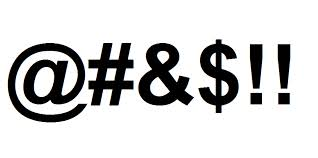Just Cussing: A Meditation on Verbal Profanity: A Speculative Essay

Rod Rainey, I don't know if you are still with us, here at Hubpages, but let me thank you for the question: Why is profanity (cuss/swear/cursing) words bad?
I wonder what the research linguists have to say about this (if indeed they have embarked upon this investigation). This really is a fascinating question to ponder: How did it come to be, as humankind was developing verbal speech, that certain words were set aside, as it were, in association with things profane; and by the way, is it not interesting that it is called 'profanity'? Would this mean that ordinary speech (or seemingly ordinary speech), such as what we are engaged in now, is, somehow, 'sacred'?
That doesn't make any sense, does it? So, how would such a research project proceed, I wonder? What would be the first step in trying to attempt to account for those words we call profanity?
Should we start with a deep consideration of what cuss words really mean; that is to say, what is the precise functionality of the words? For example, we all know the word 'F--k' means, or at least we think we know. Let's make a list!
'F--k'
1. We know that this is a curse word, profane, and 'bad.'
2. We know that it is a 'four-letter' word; and that the term 'four-letter' word is a synonym for a 'cuss' word, one that is 'profane' and 'bad.'
3. At the risk of causing some of us some embarrassment, I must acknowledge that analytical rigor requires me to note that the 'F-word' is also a rather gutter, vernacular synonym for the sex act. Does this have any significance, I wonder.
4. When we're, say, washing dishes and we drop a plate on the floor; or when we're chopping some greens for a salad to go with dinner, and we cut our finger----we may utter the word 'f--k' in frustration (Side note: In similar circumstances we might also utter the word 'sh--,' though, if you think carefully about the actual, total functionality of each word, you will see that 'f--k' and 'sh--' are NOT synonyms).
5. In any event, when we utter the word 'f--k,' in this instance, what does it mean? What is the functionality of the word in this situation of frustration?
6. Let's approach a definition this way: opposite time! As you know, there are things that we say, silly little, superstitious verbal formulations, that act as good luck charms, 'talismans,' with which we hope to bring about good fortune for ourselves. For example: You and your wife might be celebrating the birth of your first child together. It's a happy, healthy baby boy. I may say something to you like, 'Congratulations, John.' Then you, 'John,' might reply with something like, 'Thank you, God is good,' or something like that.
Let's also suppose you get news that, say, your cousin has just been arrested by the police for embezzlement and commingling of client funds, and so forth. Your reaction might, quite understandably include 'f--k!"
7. In their functionality, the profanity 'f--k,' and the phrase 'God is good,' are opposites, effectively antonyms. They are both reactions to something that has happened.
A) 'God is good' is a reaction to something good, indeed, 'blessed,' that has happened, coming into the world of a brand new person, a baby!
B) 'F--k' is a reaction to something awful that has happened.
C) The former is the acknowledgement of what we might call a 'blessing.' The latter is the acknowledgement of what we might loosely call a 'curse,' or 'cursed event.'
D) When you think about---if what we have laid out here, so far, is true---this begs the question: Why is it the case that in the former situation, the simple acknowledgement of a positive thing is permissible; and the simple acknowledgement of something bad, with a word that appropriately designates it as negative or bad, informally prohibited. Do you follow?
8) What I am asking is: What makes the word 'f--k' bad, when the thing it refers to represents a karmic 'f--k'?
9) Let's try it this way: Let's look at the anticipatory usage of the word 'f--k' as opposed to the anticipatory usage of the term 'Good Luck.'
a. 'Good Luck.' Suppose you say to me that you are in the running for a big promotion at your job: Regional Vice-President of Marketing or something. You and I meet for coffee somewhere before you have to shove off to face your 'performance review,' which you think is only a necessary formality you will have to endure before being offered the promotion. As you leave, I say to you: 'Good Luck.' By saying 'Good Luck,' I am, effectively, trying to invoke the positive forces of karma (or whatever) to bestow upon you that which you want. I am both invoking what we might call positive karma and expressing my wish and hopeful anticipation that you get your heart's desire.
b. Now suppose, instead, you tell me that your division has had sliding profits for three straight quarters, or something like that, and 'word around the water cooler' is that 'heads are going to roll' and all that. Suppose that management is going through a 'top-to-bottom' performance review of everyone in your division; and you have some justifiable concern that you, especially, have been a person to have his 'feet held to the fire,' and so forth. From all that you tell me, it does not at all look good for you. I might say something (which, on one level, is of a spirit of commiseration) like: 'Dude! You are so f--k--ed!'
Now then, by saying this (and assuming this is not a case of secret envious pleasure on my part), I am both commiserating with you and---it must be said---somehow, inviting this doom upon your head.
You see, I am so sure that this doom will befall you (though I wish it wouldn't) that, if they were giving odds on this in Vegas, I would bet very big on that outcome---that you would get 'f--k--ed.' Now I have money on the fact that you will get 'f--k--ed.'
This is quite the moral dilemma, of course, because on the one hand---as your friend---I do not want you to get f--k--ed. However, since it is also the case that I have bet money that you will be so 'screwed,' and I would obviously like to win rather than lose my bet, it now becomes the case that I need you to be f--k--ed.
Thus, when I say, 'Dude! You are so f--k--ed,' I am, in fact, invoking and calling down upon your head the dark forces of bad juju. Sorry, man, nothing personal.
Yeah, right!
It follows, then, when I use the word 'f--k--ed' in this sense, I am committing an act of evil against you. You see, in this way, I am not simply uttering a curse word, I am actually, in effect, cursing you. It is as if I am putting a 'curse' on you.
10. Hey, you know something curious---as a side note? Depending on the inflection of the voice, the name Jesus is either a simple proper noun referring to the Christian Savior; or it is the rough equivalent of 'f--k.' We might simply say Jesus as a simple proper noun; or we might say 'Jesus!' or 'Jesus Christ!,' which seems to be the rough functional equivalent of f--k.
11. But why should it be the case that it even occurs to us, at all, to 'use the Lord's name in vain,' and so forth?
12. I wonder if the same thing happens in other religions: Buddha! You are so screwed, dude. Ahura Mazda! I'm up a creek with no paddle!
13. Anyway, it is also considered profane to 'swear to God,' as in 'I swear to God, I did not commingle client funds!' Unless I'm mistaken, Quakers, for example do not swear to God. In court they do not swear to God they will tell the truth; committed atheists also, for obvious reasons, do not swear to God. They and other have the option of 'affirming' in court that the will tell the truth and nothing but the truth....
14. Often it is the case that when someone 'swears to God' about something, this is a sure sign of deception. Is it not?
15. Do you know why it is a bad thing to 'swear to God'? Because it is to falsify God's endorsement of your petty projects. Suppose I am a small manufacturer of motor scooters. Now suppose that I put out a specific line of motor scooters; and I put together a slick, suggestive marketing and advertising campaign which slyly intimates that these scooters are the preferred brand of someone like, oh I don't know, say, LeBron James.
Of course, I have not even so much as asked his permission to use his name or likeness. Suppose there turns out to be some safety issue with my line of scooters. Suppose I have to 'recall' them (or suppose that I don't).
By using LeBron James's likeness and name, without his permission no less, I have recklessly put his reputation at risk; and this could possibly mean lost, other potential endorsement revenue. I have put his brand and 'good name' in severe jeopardy. He walks down the street and people point and whisper that he's the guy who supports the sale of motor scooters that blow up and catch fire if they go over 25 mph, or something like that.
-----------------------------------------------------------------------------------------------------
Now then, I can think of three ways in which the name of Jesus is used.
A) Jesus is used as a simple proper noun.
B) Jesus is used as the rough equivalent of 'f--k.' Let's go back to the embezzlement and commingling of funds example. If you say to me that you are under suspicion of embezzlement and commingling of funds; and I say something like: 'Jesus! (f--k) You are screwed.' Again, I am simultaneously commiserating with you and, as we discussed before, 'betting on your doom.' Moreover, I am using the name of the Lord to do this, a violation of the false endorsement rule we just looked at. I am actually using Jesus Christ's name to ask the Devil to bring about my friend's doom because 'I got money on it'!
C) When we are confronted with an event of breathtaking horror, we invoke the name of Jesus! We may be confronted with the horror of the Nazi holocaust of the Jews during World War II. In the face of such unimaginable catastrophe we are left gasping: Jesus! It seems to me that the functional meaning of this particular usage is something like a 'There but for the grace of God go I.' That usage is an expression of thanks to God for having extended to you the 'grace' of having kept that particular evil from touching you; and it is also a functional appeal to the Higher Power to continue to keep you from facing such an evil.
There are those who would say that even this last usage is, if not a profanity, an indulgence. I heard a man say once something like: 'Only God has rights. Man has duties.' He would say, I think, that humankind has no business asking God for any favors.
D) Actually, I can think of one more, very minor usage of the term. Suppose you and a co-worker at your job have an argument over something---some error that allegedly threatens the organization with ruination. Perhaps you're arguing over who's fault it is, or some such thing. You two are going back and forth, and whoever gives up the argument first, to walk away from it, may do so with the oath 'Jesus!' (or 'Jesus Christ!).
What does this usage signify? Functionally, it is an appeal to the Higher Power to 'give me strength,' as it were. You are asking for 'strength' to be able to endure this idiot. Therefore, the usage of the savior's name, in this way, is an indirect way of calling someone an idiot.
-----------------------------------------------------------------------------------------------
To continue with our examination of the word 'f--k,'...
16. There is another usage of this profanity. Occasionally, we may refer to an event as being 'f--k-d' up. What are we saying when we say this? What are we saying about the nature of the event that is so apparently 'beyond the pale,' as it were?
When we refer to an event as being 'f--k-d' up, what we are saying is that the occurrence of the event represents a dramatic intrusion of outrage into our lives that violently ruptures the fabric of our lives, which we think of as being composed of 'common decency,' and the like.
When we say that an event is 'f--k-d' up, we are saying that its occurrence is a savage attack on 'common decency,' and so forth. Mind you, that which is 'f--k-d' up to you, may not be that outrageous to me. The concept can be relative.
Example
Here, in the United States of America, it would be 'f--k-d' up to many of us if there were to be a military coup that removed President Obama from office and installed someone, anyone else. It would be 'f--k-d- up because the event would be a savage attack on American 'common decency,' as it pertains of a political tradition marked by centuries now, of the peaceful transfer of power.
Now then, military coups anywhere in the world, overturning democratically elected leaders are unfortunate, counterproductive, bad, and wrong by our lights. And it is understood to be so by natives of usually developing countries. But if the concept of the peaceful transfer of power has not taken root, where such actions are, unfortunately, not unfamiliar to the population, such a coup (Thailand) probably might not be processed---not generally, anyway---as 'f--k-d' up, because the takeover is NOT a dramatic, unheard of, savage attack upon a well established tradition of 'the rule of law,' orderly democratic processes, and 'common decency.'
Even when we say that something is 'f--k-d' up in an individual, personal context, we still mean to indicate indignant outrage over what we believe to be an uncalled for, savage attack upon what we thought had been a bond (between friends, associates, whatever) of 'common decency.'
17. Another use of the word 'f--k' I can think of: Tom might say to Charles: 'F--k' you! Tom and Charles are either usual enemies or they have some kind of serious falling out (to be seen on any kind of reconciliation).
a. The functionality of a kind of renunciation, by Tom, of Charles, and everything he 'stands for'---'you and the horse you rode in on.'
b. This usage says that Charles's very presence in Tom's life, now functions as an outrageous breach of common decency.
c. This usage says that the only way that rupture can be healed would be for Charles to get out of Tom's life.
d. It is a usage of the very firmest dismissal, of exile, which we wish to effectuate even if it means bringing down sinister forces upon the head of the person we are dismissing.
17(-1). Tom and Charles might be friends and Charles might. playfully, say to Tom: 'F--k you!'
Suppose Tom is good-naturedly teasing Charles about something: the fact that he got a new haircut to impress a new woman who has shown up at their place of their employment, or something; it could be anything. Charles might respond to Tom's ribbing with a playful, 'f--k' you.
This usage seems to be the rough equivalent of 'Aw, Go on..,'
18. Let us end with a word about the use of the word 'f--k' as a substitute reference to the sex act.
A. The word is used when one is referring to the sex act without sentimentality or tenderness; and it may also be used to indicate people you don't know engaged in the sex act.
B. Suppose you (whoever 'you' may be) are talking to a friend and you say something like this: 'Yeah, Jane and I f--k-d last night and...' You do not say, 'We made love,' or even that 'We had sex.' No, you say that the two of you 'f--k-d.' Why?
Options for interpretation of this
1. You are saying it because you believe that is the way people talk 'in real life,' and that may be right.
2. If your use of the word 'f--k-d' is not merely a kind of substitution, and we can assume that you choose the word quite deliberately for referencing the sex act that you engaged in with Jane---then you are saying something about how you viewed the activity.
3. You did not view it as an act of tenderness. You did not view the sex act as a means of achieving a 'connection' and so forth.
4. I really don't have a final answer, right now, for this one. Surely you do not mean to suggest that the two of you visited something awful upon one another by having sex.
5. I don't believe I can come to a final disposition of this particular case. Perhaps you are just substituting the word to avoid sounding like a Hallmark card.
6. Perhaps one of you, reading this, can help.
Conclusion
I hope this meditation on the word 'f--k' has been of some help in answering the question about why profanity is bad. I wish others, here on HubPages, would do something similar with other cuss words. It would be interesting to see what we come up when these various writings on the subject were laid alongside one another.
By examining the word's functionality (what the word does), we got on to some clue as to why it is bad, and why it was marked as bad from the beginning.
Thank you so much for reading.
Take care!








